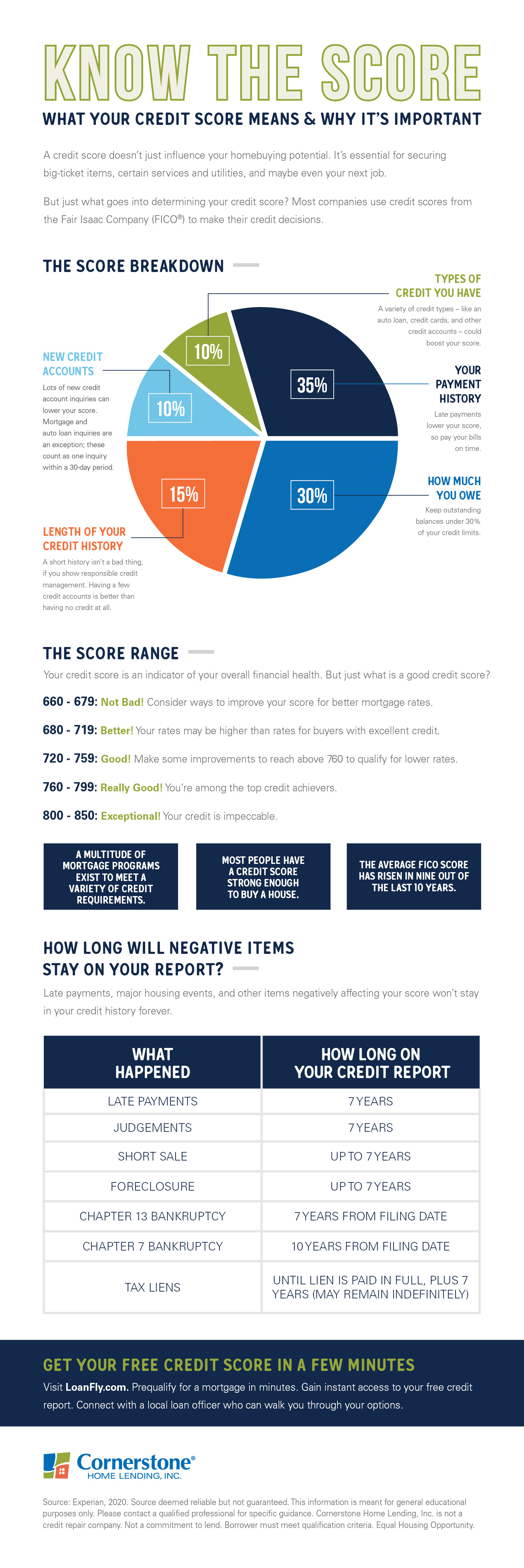
Some key facts to remember:
- Today’s credit score, AKA the “FICO score,” was introduced in 1989 by the software company FICO.
- U.S. consumer reporting agencies Equifax, Experian, and TransUnion track these scores based on credit information they provide to FICO.
- Individual scores generated by FICO for each of these agencies can and often do vary related to access to different records.
- However, all scores fall within a 300 to 850 range, with 700 or higher being recognized by most lenders as an indicator of financial health.
- Ninety percent of the largest U.S. financial institutions use FICO scores to make credit decisions.
Who said credit had to be hard? Download LoanFly and get your score for free.
How is my credit score calculated? FICO’s 5 biggies.
Exactly how is a credit score calculated? FICO determines each score based on five factors:
1. Your payment history (35 percent).
How consistently are you making payments? That’s what counts the most. Late payments on all your previous and current credit accounts lower your score, so be sure to always pay on time.
2. How much you owe (30 percent).
Next up, your balance-to-limit ratio: How much do you presently owe on all of your open accounts? How many balances do you have? How much available credit are you using? The goal here is to lower the percentage of your total credit limit that you still owe, typically aiming to keep card balances to less than 30 percent of their limit.
3. Length of credit history (15 percent).
The longer you’ve had active credit and made timely payments, the better your score will be. There’s not much you can do now to change how long you’ve had credit, but you can focus on being as responsible as possible with the way you currently manage your money.
4. New credit (10 percent).
Whenever you open a new line of credit, an inquiry is performed that negatively affects your score. The only exception is when you’re shopping for a home: All mortgage inquiries within a 30-day period count as a single pull. To maximize your score, minimize hard inquiries.
5. Other factors (10 percent).
How’s your credit score calculated when it comes to miscellaneous items? Something as small as using a variety of credit types (such as home/auto loans, cards, and personal lines of credit) can have a minor influence on your score. But it’s probably not a good idea to open a lot of new accounts just for this reason — you may incur the new credit penalty mentioned above.
Now you know the answer to “how is my credit score calculated?” But sadly, credit score misinformation is still everywhere. For example, many renters think they need an “impeccable” (800-plus) credit score to get a mortgage. This is far from true.
Experian data shows that Generation Z (ages 18 to 23) has an average credit score of 674, sitting in the “good” range. The average score for Millennials (ages 24 to 39) is 679. The average credit score for Generation X (ages 40 to 55) has risen to 698, compared to Baby Boomers (ages 56 to 74) at 736. Only the Silent Generation (ages 75 and older) reaches the score of 758, considered “very good.”
Good thing a multitude of mortgage programs exist to meet a variety of credit requirements:
- VA, FHA, and USDA loans all have low- or no-down-payment options, with a flexible credit score minimum of 580 or lower.
- None of these credit score requirements exceed 700, confirming that, right now, most people have a credit score strong enough to buy a house.
Your credit score might be checked for a home loan, property rental, new job, credit card, insurance, cell phone service, and cable/utilities. A mortgage lender is likely to use a tri-merged credit report, drawing info from all three bureaus. Then, a lender may take your lowest or middle score to determine the type and amount of mortgage you qualify for.
Your FICO score is a major factor in deciding whether your loan is approved. And at what interest rate. A slight variation of one to two percentage points can make thousands of dollars’ worth of difference in interest payments over the life of your mortgage. Getting to know what goes into your score gives you the chance to save money by taking steps to maintain it or improve it.
Unhappy with your credit score? Try doing this.
One of the first steps to bettering your credit score is actually viewing your credit history. There’s no reason to not do it since you have access to a free copy from all three reporting companies once a year at AnnualCreditReport.com.
You can also contact bureaus individually:
Keep in mind that companies that charge for credit reports are not only requiring fees you don’t otherwise have to pay, but they often don’t provide records that are as accurate as those of these three main agencies.
After receiving your reports, review them carefully. Check for incorrect or late payments, credit limits, missing accounts, and fraud so your credit history and FICO score accurately reflect your current financial activity. If you see any mistakes, notify the appropriate credit bureau within 30 days of the report date. There’s no cost associated with setting the record straight. It’s your right.
If your credit needs some TLC, you can get to that healthy window sooner than you think:
- Don’t let late payments go past 30 days. Remember, outstanding debts more than 30 days late make up 35 percent of your score.
- Shred old cards and leave them open. Since 15 percent of your credit score is based on length of credit history, it’s typically better to shred a card and leave the account at zero, even if a card is 10 or 20 years old.
- Avoid paying for everything in cash. It sounds budget-savvy, but no credit means bad credit in the eyes of a lender. So, open at least three credit cards and make occasional buys.
Small as it seems, every change you make toward repairing your credit counts. Bumping up your score may nab you an almost 1.5-percent lower rate, with potential to save you hundreds of dollars a month on your mortgage.
Working on your credit? Hold onto your hat.
Your credit score can open or close doors, whether you’re buying a house, looking for a job, or ordering cable. Knowing how it works puts you in control. By boosting your score, you’re giving yourself more homebuying power. You’re also making yourself potentially eligible for many more affordable mortgage programs. Use LoanFly to check your score and let the fun begin.
For educational purposes only. Please contact your qualified professional for specific guidance.
Sources are deemed reliable but not guaranteed.

